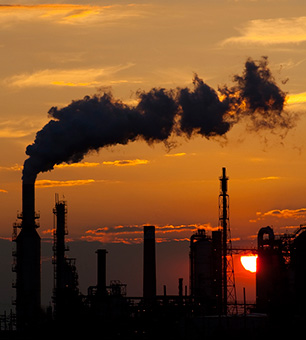Subsidies to dirty and wealthy fossil fuel companies represent a paradoxical misalignment of priorities. Action to remove fossil fuel subsidies must be a centerpiece of international and national climate efforts.
The final embers of heated debate have fully fizzled out at the UN climate change negotiations in coal-friendly Poland. While the formal negotiations were plagued by inaction, one hopeful dialogue emerged in Warsaw among some of the most influential players in global politics.
In a series of panels, representatives of the World Bank, International Monetary Fund, International Energy Agency and Organisation for Economic Co-operation and Development all argued the benefits of, and need for, fossil fuel subsidy reform.
As Rachel Kyte, vice president of Sustainable Development at the World Bank explained during a panel on the subject, “This is the ultimate test of policy coherence. We can try to raise $100 billion. We can, as multilateral development banks, invest $27 billion in climate mitigation and adaptation projects [as we did] last year alone. But we’re wasting $500 billion in fossil fuel subsidies each year.”
Data from the organization Oil Change International confirms that the wealthy world is subsidizing the extraction, processing, transportation and use of oil, coal and natural gas at a rate of more than five times that of what we are contributing to help countries affected by climate change to adapt.
This is a gross and paradoxical misalignment of priorities. Governments waste precious time and money maintaining an uneven playing field for the largest fossil polluters, providing $6 to carbon-intensive fuels for every $1 that goes to renewable sources. Meanwhile, poor countries continue to experience climate change impacts worst and first. Those in the least-developed countries experience deaths from climate-related disasters like typhoons, droughts and floods at a rate of nearly six times the global average.
Yet, the current dialogue and efforts among the large multilateral development organizations are incomplete. The World Bank, for example, despite progress on a new policy to limit loans to coal, continues to finance fossil fuel projects. According to Oil Change International, fossil fuel lending from the bank actually increased from 2012 to 2013, with $336 million of continuing support for fossil fuel exploration projects.
Steve Kretzmann at Oil Change International explained, “Without a doubt, we have to think about putting production subsidies, particularly subsidies for new exploration in the red [unfavorable] category, and that’s because we have IEA [International Energy Agency] and IPCC [Intergovernmental Panel on Climate Change] telling us we need to leave roughly two-thirds of the existing fossil fuels in the ground if we’re going to meet our goals of staying under 2 degrees of climate change.”
He continued, “Why in God’s name are we spending billions more, incentivizing companies to find more of something that we can’t burn? That makes absolutely no sense.”
New research published in the journal Climatic Change revealed that just 90 companies produce two-thirds of all greenhouse gas emissions, with many of the biggest receiving large annual subsidies. In the United States alone, the top five investor-owned corporations on this major polluter list – Chevron, Exxon Mobil, British Petroleum, Shell and ConocoPhillips – receive $2.4 billion of tax breaks from Congress annually, despite holding more than $71 billion of cash reserves.
The growing international attention on this issue is beginning to pay off. The UK and the United States recently committed to stop funding coal-fired power stations in developing countries. And this week, the ministers of 28 member states of the International Energy Agency committed to phase out “inefficient” fossil fuel subsidies. They also encouraged countries to take subsidy reform into account as they prepare their commitments for a new international climate framework, to be agreed upon in 2015.
However, previous commitments to phase out fossil fuel subsidies made in 2009 by governments of the Group of 20 major economies have yet to be fulfilled. If we are to have any chance to prevent catastrophic climate change and redress the impacts of already-locked-in warming experienced by vulnerable peoples around the world, eliminating fossil fuel welfare to mega-polluters like Chevron and Exxon Mobil will need to become a centerpiece of the UN climate negotiations in 2014.
This will require civil society to ramp up efforts to challenge government handouts to big oil, gas and coal. These efforts already have broad public support. Fossil fuel subsidy reform means taking a firm stand against giveaways to the wealthiest and dirtiest corporations on the planet, while providing targeted support to the poor as we transition to sustainable energy.
Our most important fundraising appeal of the year
December is the most critical time of year for Truthout, because our nonprofit news is funded almost entirely by individual donations from readers like you. So before you navigate away, we ask that you take just a second to support Truthout with a tax-deductible donation.
This year is a little different. We are up against a far-reaching, wide-scale attack on press freedom coming from the Trump administration. 2025 was a year of frightening censorship, news industry corporate consolidation, and worsening financial conditions for progressive nonprofits across the board.
We can only resist Trump’s agenda by cultivating a strong base of support. The right-wing mediasphere is funded comfortably by billionaire owners and venture capitalist philanthropists. At Truthout, we have you.
We’ve set an ambitious target for our year-end campaign — a goal of $112,000 to keep up our fight against authoritarianism in 2026. Please take a meaningful action in this fight: make a one-time or monthly donation to Truthout before December 31. If you have the means, please dig deep.
